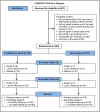Project RETAIN: Providing Integrated Care for People With HIV Who Use Cocaine
- PMID: 40276720
- PMCID: PMC12019636
- DOI: 10.1093/ofid/ofaf104
Project RETAIN: Providing Integrated Care for People With HIV Who Use Cocaine
Erratum in
-
Correction to: Project RETAIN: Providing Integrated Care for People with HIV who use Cocaine.Open Forum Infect Dis. 2025 May 6;12(5):ofaf272. doi: 10.1093/ofid/ofaf272. eCollection 2025 May. Open Forum Infect Dis. 2025. PMID: 40330802 Free PMC article.
Abstract
Background: People with HIV (PWH) who use cocaine are less likely to achieve virologic suppression (<200 copies/mL) because of poor engagement in care. We tested the efficacy of an integrated substance use treatment and outpatient HIV care intervention on improving viral suppression in nonsuppressed PWH who use cocaine.
Methods: Project RETAIN recruited 360 cocaine-using PWH who were not virologically suppressed in Miami, FL, and Atlanta, GA. Patients were randomized to treatment as usual (TAU) or the intervention, which included patient navigation and substance use treatment with motivational enhancement therapy and cognitive-behavioral therapy. The primary outcome assessed viral suppression at 6- and 12-month follow-up.
Results: There was no difference in viral suppression by group (TAU = 17.1%, intervention = 15.6%, P = .897). The intervention group had significantly more participation in substance use treatment (87.0%) than TAU (7.2%, P < .001). There were significant decreases in stimulant use in both groups, but oxycodone use decreased more in the intervention group. Severe psychological distress (32% of the baseline sample) declined differentially at 6 months (TAU = 24.5%, intervention = 16.1%, P = .0492).
Conclusions: Only a minority of PWH who used cocaine became virally suppressed over the 12-month study, with no effect of the integrated intervention. Patients in the intervention did have reduced psychological distress postintervention. Despite more substance use treatment in the intervention, both groups declined equally in substance use. Interventions that improve retention in care and viral suppression are needed for this vulnerable population, including those that address their other complex medical and psychosocial needs.
Clinicaltrialsgov: NCT01614106.
Keywords: HIV; cocaine use; delivery of health care; integrated; patient navigation.
© The Author(s) 2025. Published by Oxford University Press on behalf of Infectious Diseases Society of America.
Conflict of interest statement
Potential conflicts of interest. There are no conflicts of interest to report.
Figures



References
-
- Edlin BR, Irwin KL, Faruque S, et al. Intersecting epidemics–crack cocaine use and HIV infection among inner-city young adults. N Engl J Med 1994; 331:1422–7. - PubMed
-
- McCoy CB, Metsch LR, Inciardi JA, Anwyl RS, Wingerd J, Bletzer K. Sex, drugs, and the spread of HIV/AIDS in Belle Glade, Florida. Med Anthropol Q 1996; 10:83–93. - PubMed
-
- National Institute on Drug Abuse. Research Topics: Cocaine. 2024; Available at: https://nida.nih.gov/research-topics/cocaine. Accessed 3 March 2025.
Associated data
Grants and funding
LinkOut - more resources
Full Text Sources
Medical

